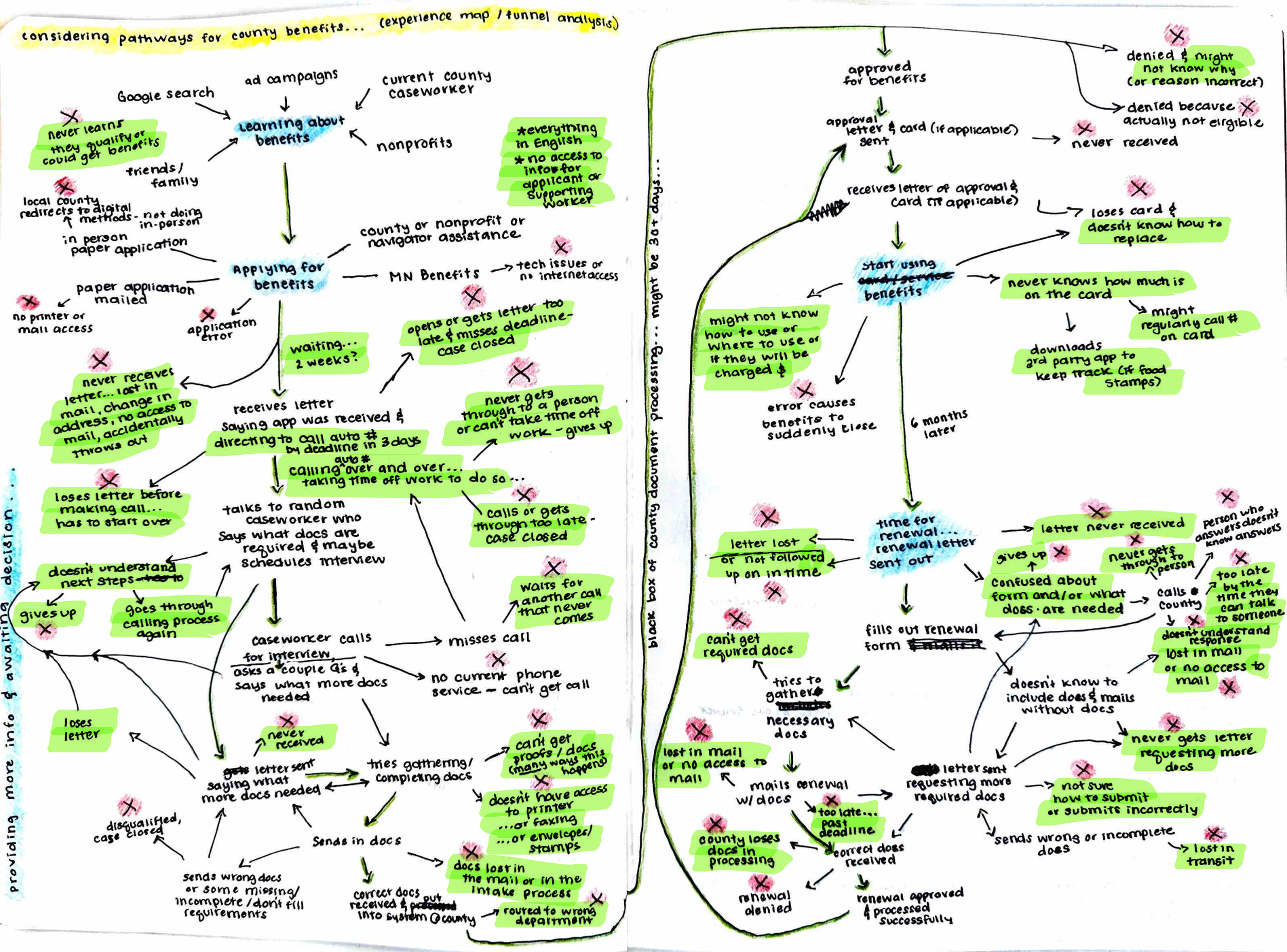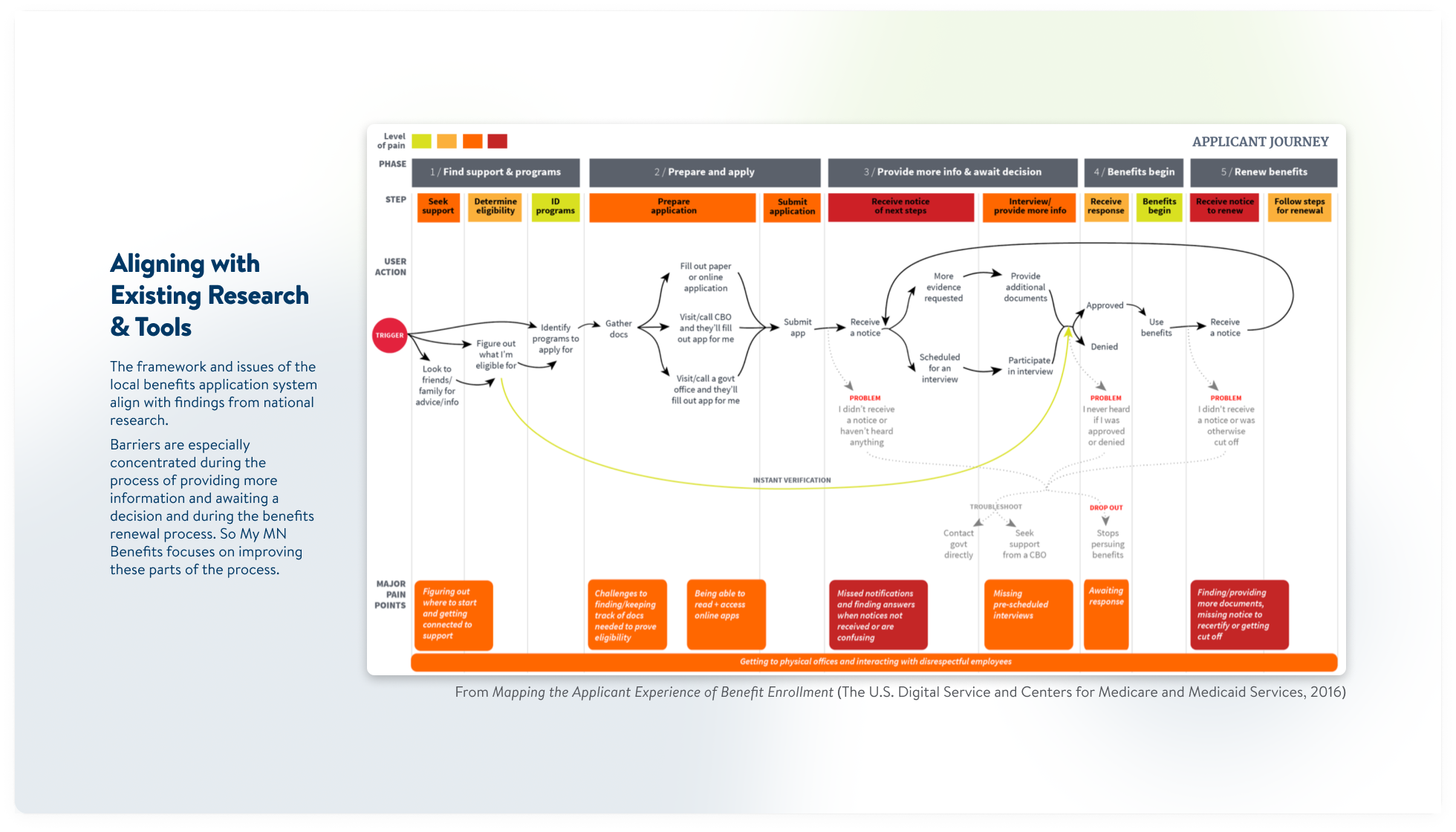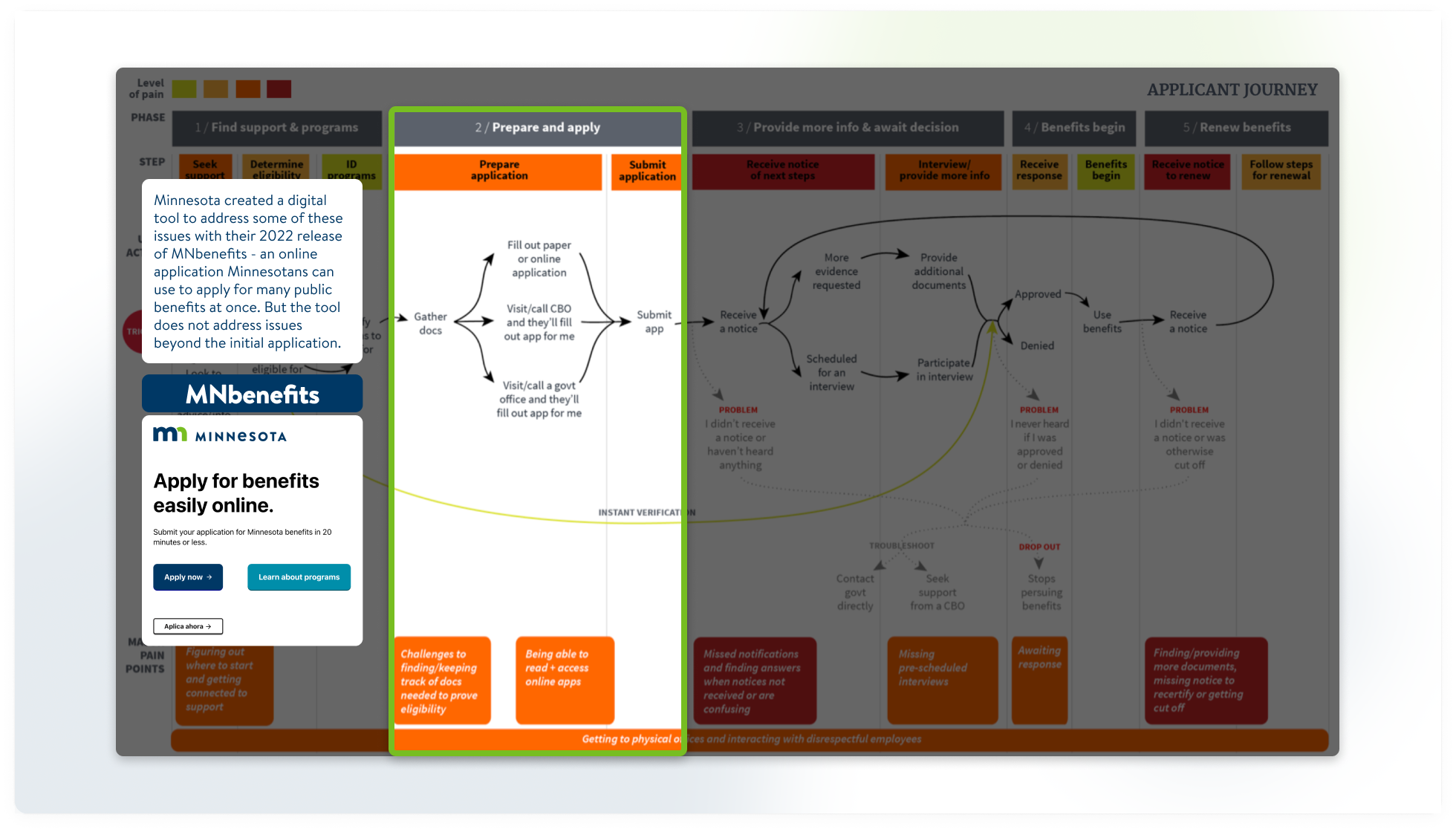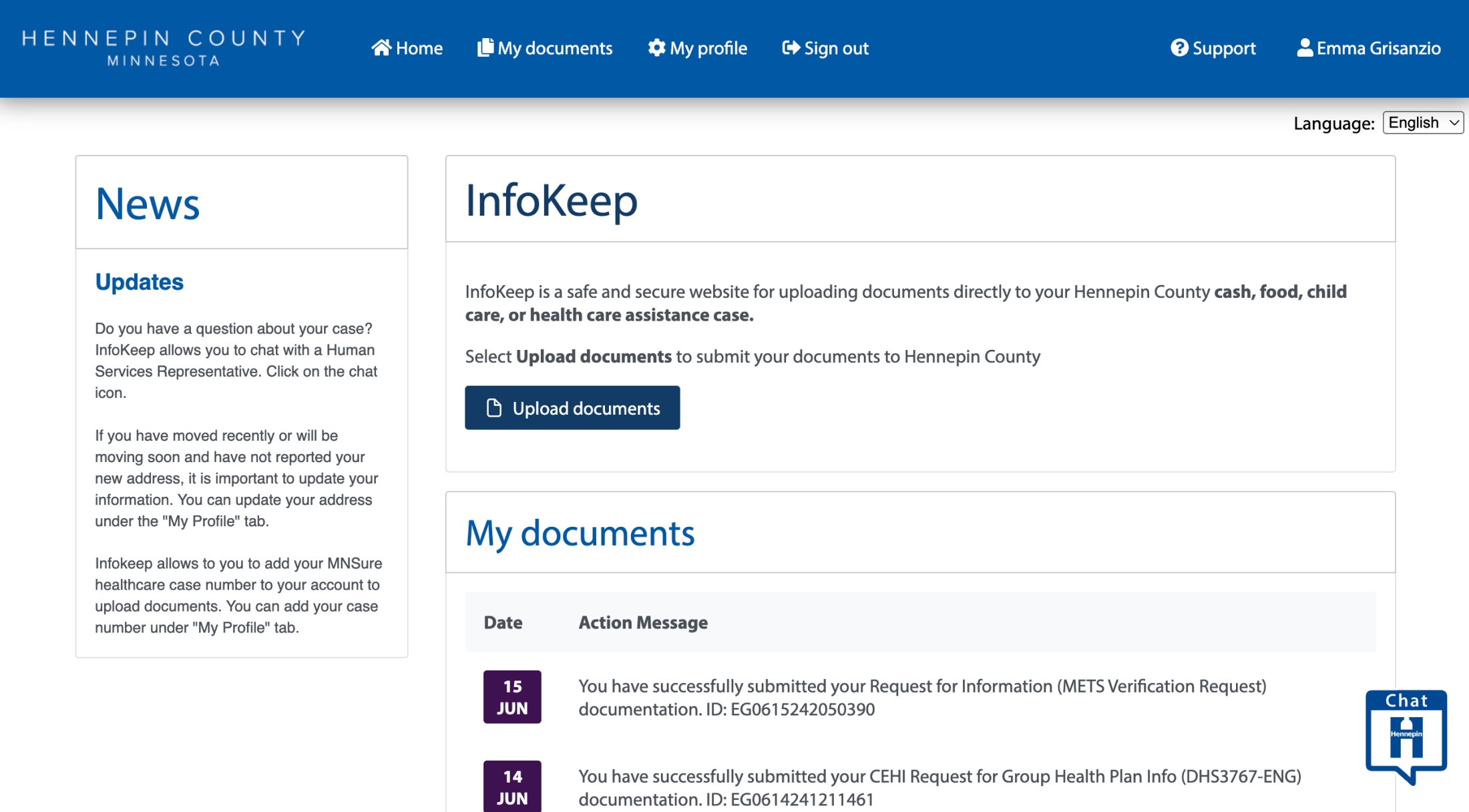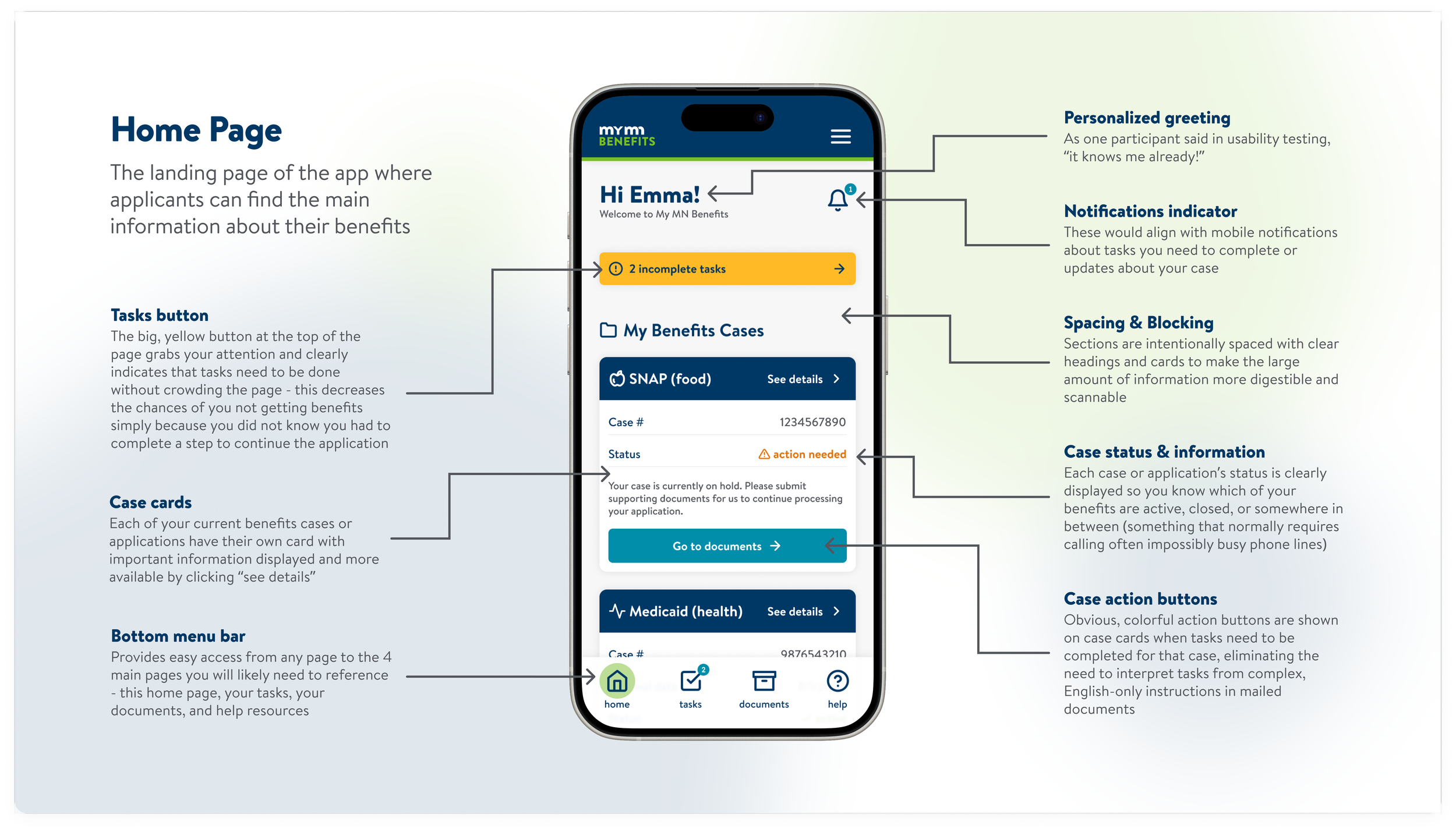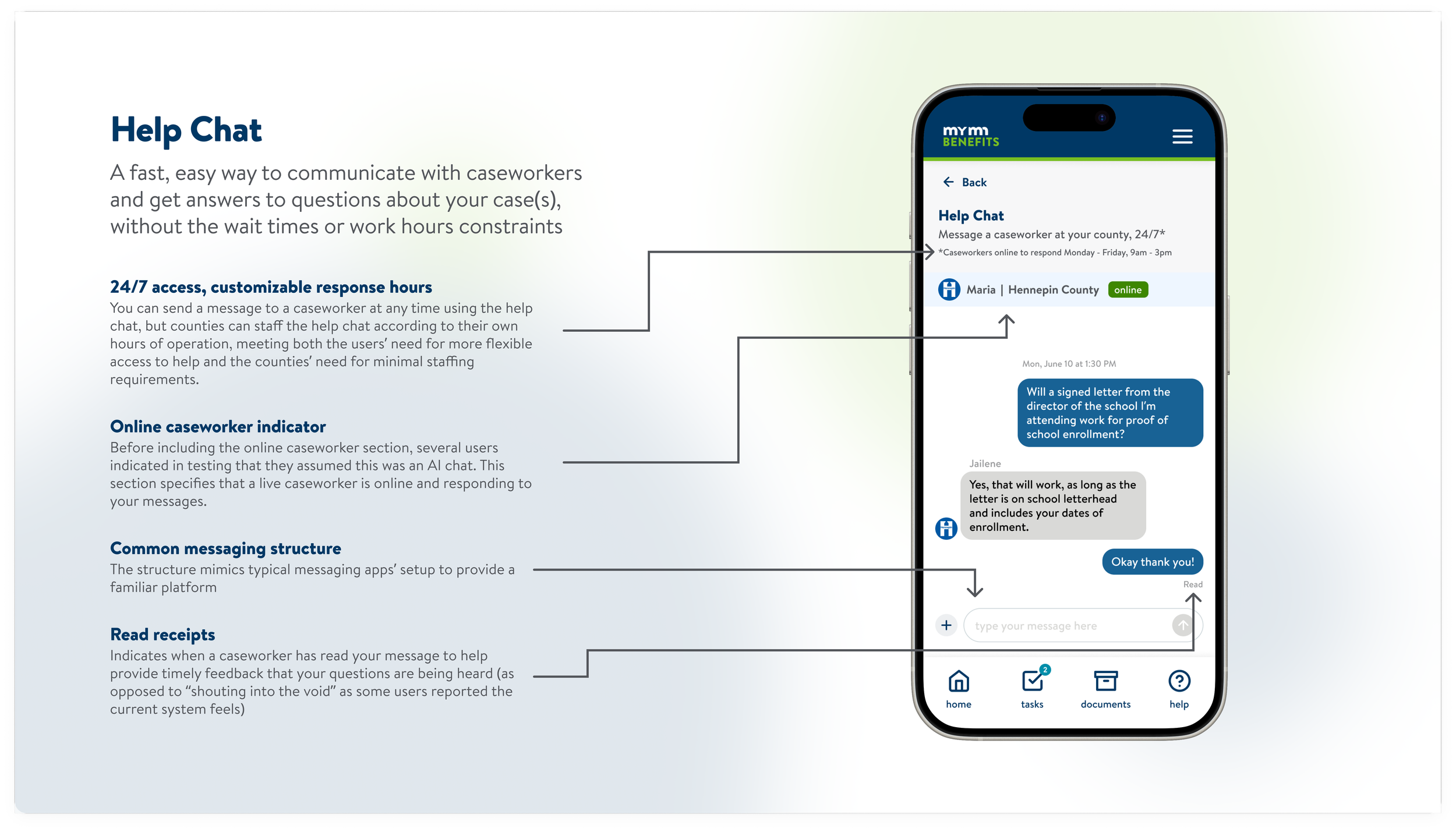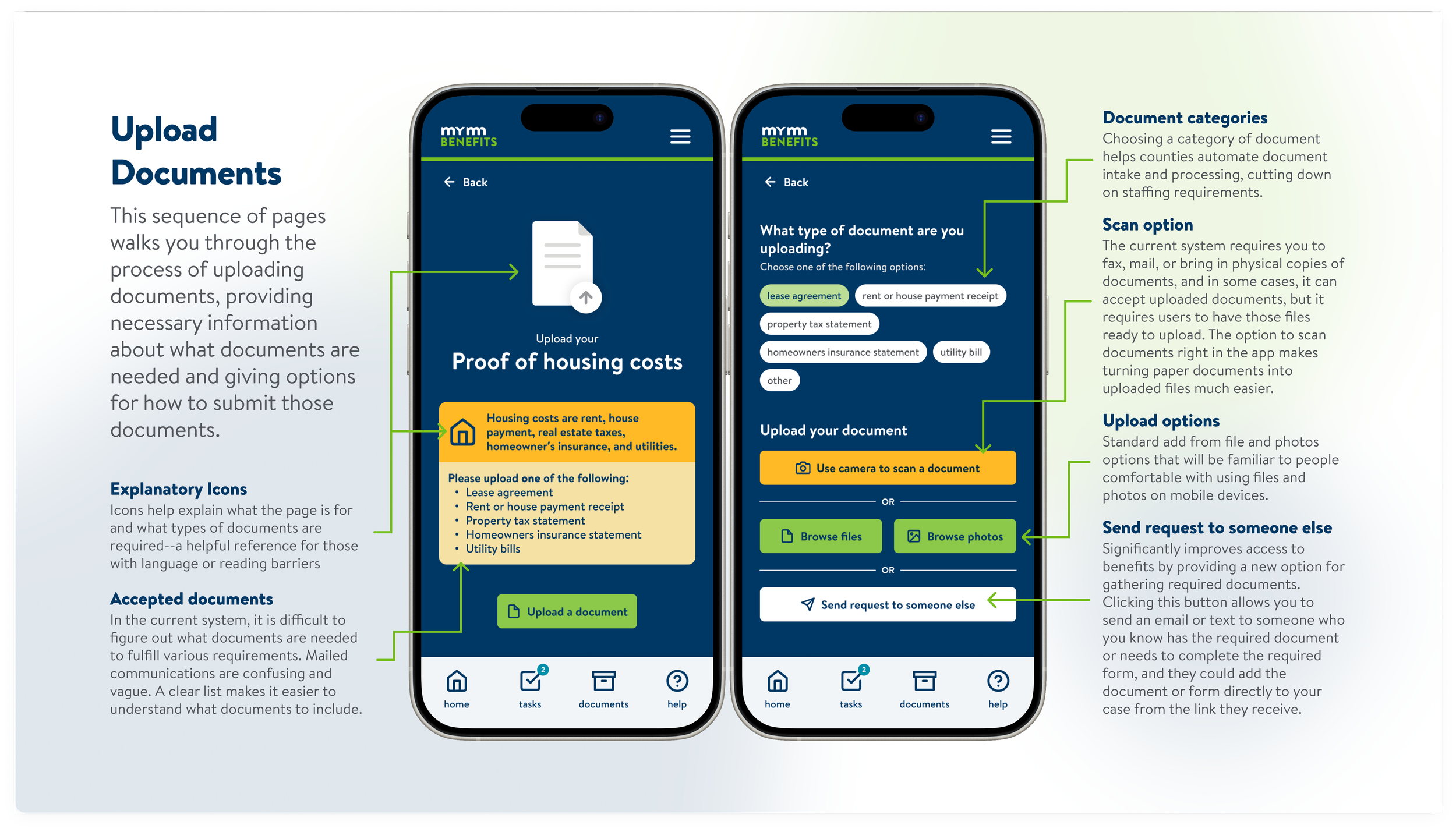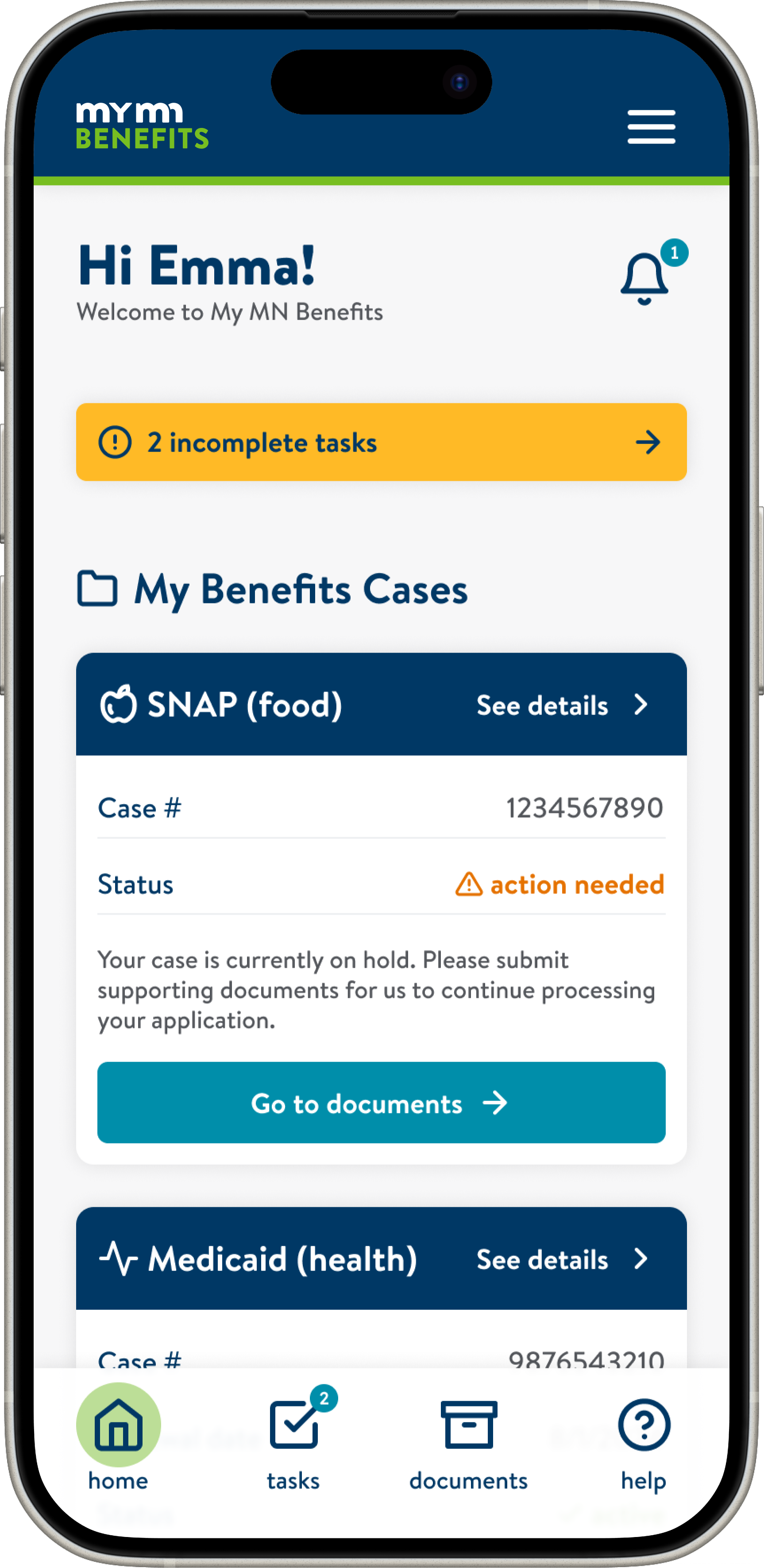
My MN Benefits
Making public benefits access simpler and easier for Minnesotans
The Context
Creating a digital tool for public benefits enrollment and management
Accessing public benefits in Minnesota is a complex and confusing process. As a benefits applicant myself and a former caseworker who has supported many folks in navigating the public benefits system, I can attest to both how difficult the process is and how life-changing these benefits can be. So for years now, I have wanted to create an app that would improve the public benefits enrollment experience.
Making a simple tool for a complex system
Working independently, I pulled from secondary research and spoke with benefits applicants and other stakeholders to understand the current public benefits system in Minnesota and establish a design strategy for a digital tool. I determined that an app that specifically focuses on the post-application phase of the enrollment process and the renewal process would be most useful and implementable.
Based on my research and multiple rounds of usability testing, I created an initial design and interactive prototype for My MN Benefits—a public benefits enrollment and management app.
Role
UX Researcher & Designer
Dates
July 12 - 29, 2024
Methods & Tools
Secondary research, stakeholder & user interviews, experience mapping / funnel analysis, interactive digital prototyping, Figma, Zoom
The Problem
The public benefits enrollment process in Minnesota is complex, antiquated and inaccessible
Applying for public benefits is a long, confusing, multi-step process with high stakes for applicants and little support along the way. But improving this process is a complicated task, given the huge number and variety of applicants, the many different types of benefits and their corresponding processes, and the countless government entities with their own deeply engrained internal systems involved in administering benefits. But I knew based on recent local, state, and national projects that a digital tool could be agile enough to navigate these complexities.
Illustrating the issue - my benefits enrollment process:
38+ mailed documents (shown here)
23 phone calls (only 2 got through to a person)
2 hrs, 10 min on the phone
4 rounds of submitting supporting docs, sourced from 5 people
2 months, 2 weeks and counting to complete the process
Mapping the public benefits enrollment experience
To identify the specific barriers in the public benefits enrollment process and to determine how a digital tool could help, I started by mapping out the MN public benefits enrollment process.
I found that barriers fall into categories such as:
Reliance on snail mail - paper mail is slow, unreliable, and inaccessible for those without a permanent address. And letters are an inflexible form of communication that is hard to understand and easy to lose. Submitting documents through the mail has its own cost and time barriers.
Overburdened phone lines - the current process requires phone interviews for many benefits, but phone lines have limited hours and often impossibly long hold times
Language inaccessibility - current communications are long, English texts filled with government jargon and unclear instructions, making them hard to understand for folks with varying language, reading skills, access needs
Time constraints - offices and phone lines have limited hours, making access difficult for folks who work daytime jobs. Processing and communications can also take weeks to months, while deadlines for applicants often leave them with very few days to complete follow-up tasks and documents submissions.
Mapping the MN public benefits enrollment process - every red "x" indicates a way someone can fall off the process and not get benefits. Green highlights indicate the barriers to benefits access that could be addressed with a digital tool like My MN Benefits
Situating the problem within national and local contexts
The U.S. Digital Service and Centers for Medicare and Medicaid Services’ 2016 report Mapping the Applicant Experience of Benefit Enrollment reveals that this pathway to benefits and many of the barriers along the way are common in benefits systems across the country. And it was this research that helped inform the creation of MNbenefits in 2022, which provided a one-stop online application for applying for Minnesota public benefits.
While MNbenefits was a huge step in making the application process more accessible, it did not address the pain points and barriers that arise after the application is submitted. So I focused on building My MN Benefits to pick up where MNbenefits leaves off, supporting applicants after the initial application submission through to successful acquisition and renewal of benefits.
The U.S. Digital Service and Centers for Medicare and Medicaid Services’ 2016 report Mapping the Applicant Experience of Benefit Enrollment aligns with the stages and barriers I found when I mapped Minnesota's benefits enrollment process.
In 2022, Minnesota launched MNbenefits, an online application that can be used to apply for a number of public benefits at the same time. MNbenefits, based in part on this national research, only addresses the initial application phase of benefits enrollment.
My MN Benefits picks up where MNbenefits leaves off to fill in the rest of the benefits enrollment, management, and renewal process after the initial application. And My MN Benefits intentionally ties into MNbenefits' style and structure to make the handoff from one to the other simpler.
The Research
Exploring similar platforms
I started by researching similar benefits application and management platforms, both for Minnesota benefits and across the county, including:
MNbenfits (the current MN general public benefits online application)
MNSure (the current MN website for applying for and managing medical assistance
Hennepin County InfoKeep (Hennepin County’s new platform for chatting with caseworkers and uploading certain documents for benefits cases)
Your Texas Benefits (Texas’s current app that offers similar functionality to My MN Benefits - a few different states have apps, but Texas seems to have the most successful, widely-used implementation of the idea)
Gathering info and feedback from benefits applicants, stakeholders, and experts
I pulled from my and others’ experiences and feedback to work out users’ needs for the design. Information sources included:
My own experience as an applicant and caseworker
Consultations with 2 former caseworkers
Interviews & usability testing with 7 primary users (benefits applicants) with varying comfort levels with English and digital tools
A series of consultations with other UX practitioners
Understanding the system on a state and local level
I dug into the existing system for public benefits, focusing on the largest, most complex benefits administrator in the state (Hennepin County) to find detailed structural information.
MN state system publications like the “Combined Manual” for benefits and various benefits application forms
News articles & reaching out to a local journalist who highlighted this issues in MinnPost
Hennepin & state reports & data
2 “help chat” conversations with caseworkers through InfoKeep and MNbenefits
Consultations with 2 Hennepin County UX staff, along with attempted conversations with 7 other Hennepin County staff
The Design
Creating an app to support both benefits applicants and benefits administrators
Based on my research, I focused my design to meet the needs of benefits applicants—the primary users. But I also considered the needs of benefits administrators, since a digital tool could not be adopted without their buy-in.
Benefits applicants need…
Information & instructions that are clear, easy to find, and accessible for a wide variety of applicants
Easy access to help
A faster process with less waiting and uncertainty
Notifications and feedback loops that are reliable and timely
Benefits administrators need…
More applications completed within mandated timeframes
Decreased staff workloads (e.g. call volume, document intake)
Process and data structures that align with existing systems
Scalability for integration across departments and government entities
See selected annotated wireframes from the final design below, view the full report, or check out the interactive prototype.
Next Steps
Building out the app to be a viable tool
I would love to have the opportunity to continue working on this app or a similar tool to get it to the point that it could be a viable tool for the state and counties to adopt and build into the current benefits enrollment system. Next steps would include:
More user testing
Incorporating more of my usability testing findings
Doing more extensive usability testing
Building out features
Desktop version
County / caseworker side of the platform
Health insurance card and coverage info
More EBT card info and dashboard
In-app forms (applications, renewals, proofs)
Send documents request to someone else
More info about benefits, news, opportunities
Options to submit forms and documents without logging in
Making this real
Assessing scope with stakeholders
Merging with MNbenefits and InfoKeep
Finding funding
Interactive prototype


